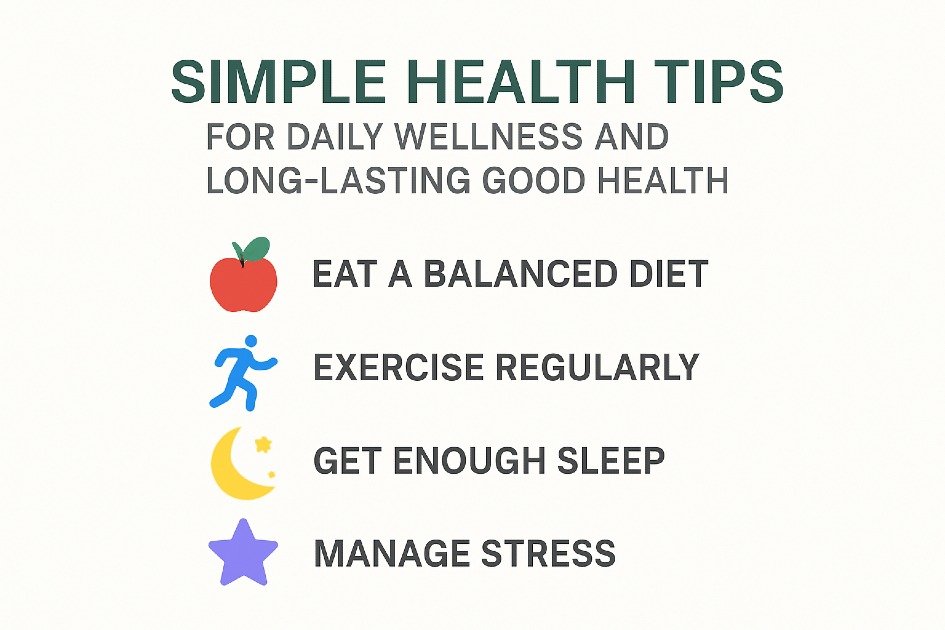Simple health tips do not have to be complicated; they often begin with the smallest daily decisions. Simple Health Tips are the foundation that shapes our feelings, thoughts, and lives.
Focusing on simplicity allows for a lighter approach, focusing on consistency and reducing pressure. Even slight changes, like drinking more water or stretching in the morning, can spark momentum and produce bigger benefits over time.
Health is a lifelong journey, not a destination. Adopting simple health tips creates a flexible approach that grows with you, regardless of age or lifestyle.
Start with manageable steps and allow progress to build naturally. Good health is not reserved for experts or athletes, but anyone willing to take small steps and keep going.
Remember, lasting health is built on everyday choices that seem simple yet matter most. Tools like wellness journals can help track habits.
Harvard Health suggests that small, consistent habits like morning stretching can significantly improve well-being, improve circulation, and promote relaxation, setting a positive tone for the day.
This guide offers practical ways to incorporate simple health tips into your daily routine, providing clear, actionable steps to strengthen your body, refresh your mind, and create a sustainable lifestyle.
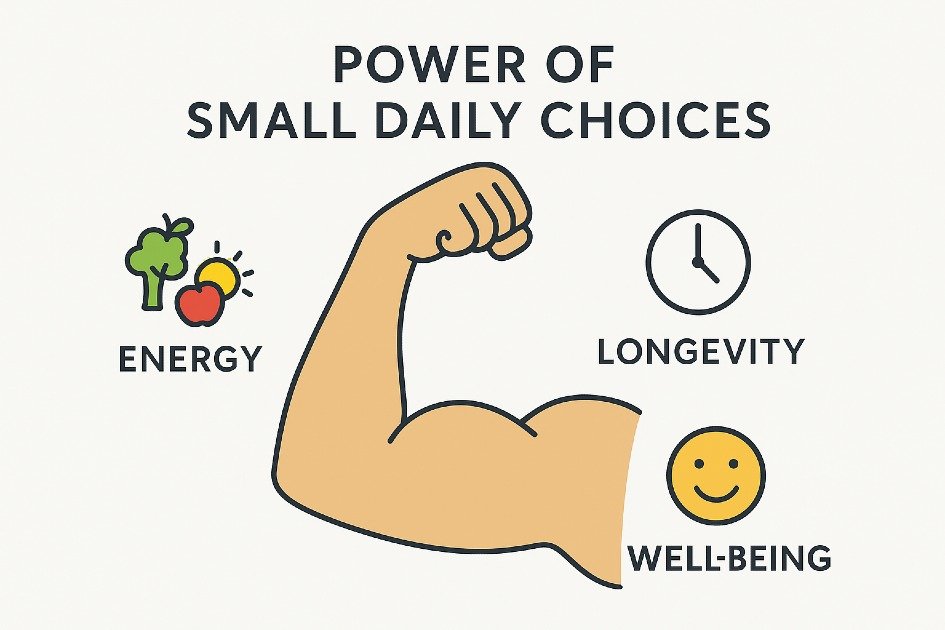
The Power of Small Daily Choices
Many people think they need a big lifestyle change to live healthiy. But real health comes from small daily choices.
These tiny steps build strong results over time without feeling hard. That is why following simple health tips is one of the best ways to keep your body and mind strong.
Choosing Whole Foods Over Processed Shortcuts
Why it matters:
- Consuming fresh fruits, vegetables, and lean proteins provide clean, strong fuel, while processed foods contain sugar, unhealthy fats, and chemicals, harming health and energy.
How to do it:
- Choose fruit or nuts instead of sugary snacks.
- Swap soda for sparkling water with a slice of lemon.
- Put one more vegetable on your plate at dinner every night.
- Shop at local markets or use healthy food delivery to choose whole food easily.
I swapped my afternoon candy bar for an apple with almond butter. At first, it felt small, but soon I had more steady energy and fewer sugar crashes.
Making Hydration a Daily Habit
Why it matters:
- Insufficient water intake leads to tiredness, memory loss, and mood swings, while maintaining strong organs, glowing skin, and smooth joints.
How to do it:
- Keep a reusable water bottle with you all day.
- Drink a glass of water first thing in the morning, before your coffee.
- Try adding cucumber, mint, or berries to your water for a tasty, refreshing drink.
- Use phone alarms to drink water until it feels automatic.
I swapped soda for sparkling water. It cut my sugar and calories and helped stop bloating and cravings.
Prioritizing Small Movement Breaks
Why it matters:
- Regular movement enhances focus, burns calories, and maintains heart health, while prolonged sitting can stiffen the body, strain posture, and slow blood flow.
How to do it:
- Get up and stretch every half hour.
- Climb the stairs instead of using the elevator.
- Take a 5-minute walk after eating to help your digestion.
- Do quick workouts with home exercise gear during your breaks.
Practicing Mindful Breathing
Why it matters:
- Mindful breathing effectively combats stress, calms thoughts, and promotes relaxation, promoting overall health and increased focus.
How to do it:
- Breathe slowly and deeply three times before starting a stressful task.
- Take five minutes before bed to do deep belly breathing.
- Take slow breaths and list your blessings to relax your mind.
- Try short guided meditations.
Harvard Health suggests that focusing on your breath as an entry-level meditation can effectively reduce stress.
Setting Realistic Sleep Routines
Why it matters:
- Lack of sleep weakens the immune system, disrupts hormones, and increases appetite, whereas good sleep boosts energy, focus, and body repair.
How to do it:
- Go to bed at the same time each night, even on weekends
- Wind down with a bedtime ritual: lower the lights, turn off screens, and enjoy a cup of herbal tea.
- Make your bedroom cool, dark, and quiet so you can sleep better.
- Use blackout curtains and ergonomic pillows to sleep better.
Choosing Social Connection Over Isolation
Why it matters:
- Friends provide emotional strength and encourage daily habits that improve overall well-being, thereby reducing stress, reducing depression, and promoting overall health.
How to do it:
- Pick up your phone and call or text someone you love instead of wasting time on social media.
- Meet a friend each week for a walk, coffee, or meal.
- Join local volunteer groups to meet new friends and make a difference.
- Join a wellness retreat to refresh your mind and build stronger connections.
Staying Consistent Without Perfection
Why it matters:
- People often quit healthy habits when they do not see results fast, but real health grows when you keep trying every day, even if you are not perfect.
How to do it:
- Choose growth over flawlessness.
- Enjoy your small wins, like drinking extra water or skipping an unhealthy snack.
- Track your habits to see your progress clearly.
- Focus on building health step by step, not all at once.
When I follow simple health tips each day, I feel stronger and more focused. I do not need to change my whole lifestyle, just take small steps that fit into my routine.
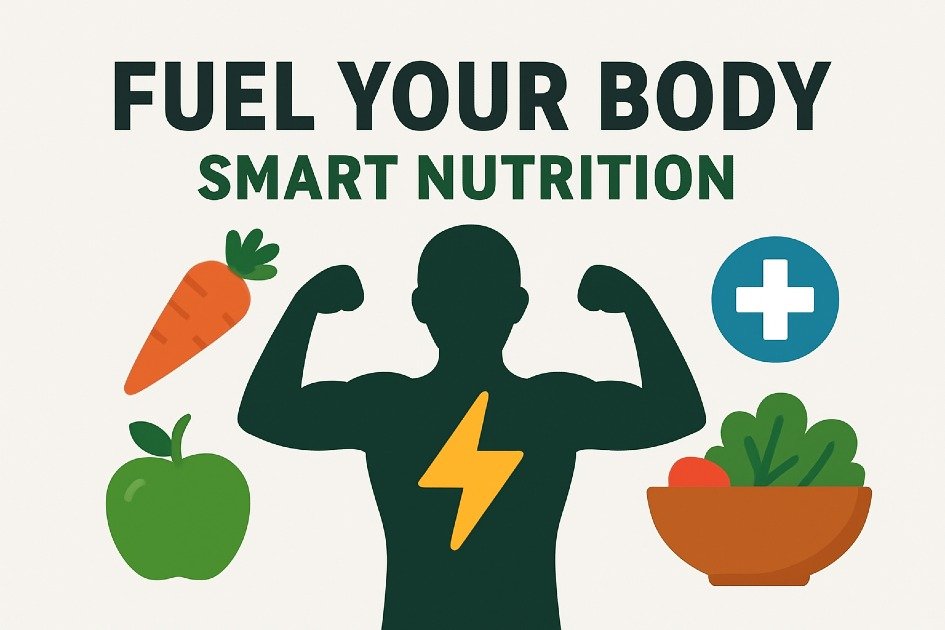
Fuel Your Body with Smart Nutrition
Nutrition plays a crucial role in simple health tips, shaping feelings, energy, and body defense. Small, thoughtful changes do not require complicated diets or expensive supplements.
Balance Your Plate Without Overthinking
Why it matters:
- Eating balanced meals keeps your blood sugar steady. A plate with protein, fiber, and healthy fats helps you feel full longer and avoid overeating.
How to do it:
- Eat lots of colorful vegetables—fill half your plate with them at every meal.
- Eat a palm-sized piece of lean protein such as chicken, fish, or beans.
- Add a small portion of healthy fats like avocado or olive oil to your meals.
When I added vegetables to my lunch, I stayed energized all evening and did not crave sugary snacks. Using meal prep containers helps me portion them easily.
Mindful Eating Instead of Mindless Snacking
Why it matters:
- Eating too fast or while distracted can make you eat more than you need. Paying attention to your food helps you enjoy it and notice when you are full.
How to do it:
- Eat at the table, not while walking or driving.
- Take small bites and set your fork down between them.
- Pay attention when your body feels hungry or full.
When I practiced mindful eating, I noticed I often ate out of boredom, not hunger. This helped me stop snacking late at night.
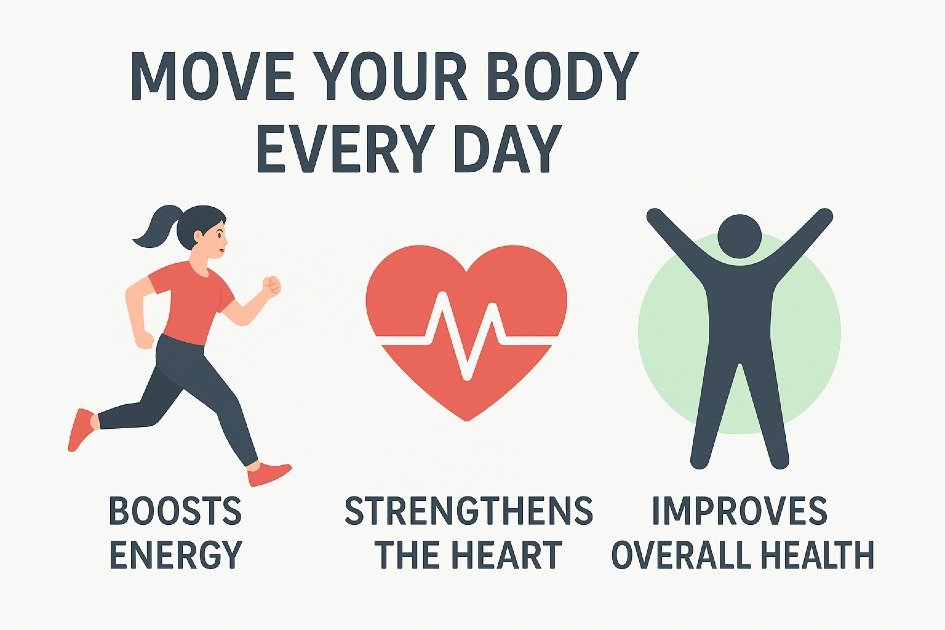
Move Your Body Every Day
Staying active keeps you healthy, increases energy, sharpens focus, and builds strength. You can take small daily steps to live a healthier life.
Walk Your Way to Better Health
Why it matters:
- Walking boosts your heart, helps blood flow, and clears your mind. It is easy on your joints, so anyone can do it.
How to do it:
- Try walking for 10 minutes after meals to help your digestion.
- Build up to 30 minutes a day at a pace that feels easy.
- Track your steps with a fitness tracker or wear shoes made for walking to stay motivated.
When I walk every day, my body feels stronger and my mind feels clear, helping me manage stress better.
Stretching and Flexibility for Joint Freedom
Why it matters:
- Stretching is crucial for maintaining flexible muscles, as tight muscles can cause back pain, poor posture, and difficulty moving, while flexible muscles aid in daily tasks.
How to do it:
- Start your day with 5–10 minutes of gentle stretching to wake up your body.
- Work your big muscles—hamstrings, shoulders, and hips.
- Use a beginner-friendly yoga mat for extra comfort and dedicated support.
I stretch during the day, and it makes my body feel fresh, like I just pressed a reset button.
Fun Physical Activities That Do Not Feel Like Exercise
Why it matters:
- Traditional workouts may not be enjoyable for everyone, and if exercise feels like a chore, it is unlikely to be consistent.
How to do it:
- Turn up your favorite songs and dance in your living room.
- Play a fun game with friends or kids, like tag or frisbee.
- Join local classes such as Zumba, martial arts, or beginner dance.
I feel happy when I move my body in short, playful bursts.
Strength Training for Everyday Energy
Why it matters:
- Strength training aids in building muscle that supports bones, prevents falls, and maintains strength throughout life, making tasks like carrying heavy bags easier.
How to do it:
- Begin with simple bodyweight exercises: squats, wall push-ups, and lunges.
- Start using light dumbbells and slowly increase the weight as you get stronger.
- Do two sessions each week, keeping them simple and steady.
I take this small step every day, and my balance, energy, and confidence grow.
Making Movement Part of Your Daily Rhythm
Why it matters:
- Consistency over intensity is crucial for health benefits, and small daily habits can be significantly improved without the need for a gym.
How to do it:
- Choose stairs over elevators whenever you can.
- Get up and stretch every 45 minutes of sitting.
- Walk extra steps by car park a bit farther away.
Over time, these small moves feel natural, and exercising becomes part of my everyday life, not a chore.

Prioritize Quality Sleep
Sleep is crucial for the body’s natural repair system, impacting mood and immune system. Prioritizing sleep is an easy yet powerful step towards lasting wellness.
Create a Bedtime Routine That Works
Why it matters:
- Following a regular bedtime tells your brain to rest. It drops stress levels and gets your mind ready for deep sleep.
How to do it:
- Turn off bright lights an hour before bed.
- Put away phones and tablets.
- Read a book, listen to soft music, or take a warm shower to relax.
- If you feel restless, drink chamomile tea or try a sleep supplement.
When my evenings get messy, my body struggles to relax. I follow a simple bedtime routine, just like kids do, and it helps me feel calm and ready for sleep.
Optimize Your Sleep Environment
Why it matters:
- Even tiny distractions, like a flashing light or a hot room, can wake you from deep sleep.
How to do it:
- Make your room dark, quiet, and a little cool.
- Use blackout curtains, a white-noise machine, and breathable bedding for better sleep.
- Use a comfortable pillow or mattress
Harvard Health emphasizes sleep hygiene, which includes creating a comfortable sleeping environment, maintaining a consistent sleep schedule, following a bedtime routine, establishing daytime habits, and tailoring these practices for optimal results.
I want my bedroom to feel like a peaceful retreat, not a second office. I pay attention to the light, the temperature, and the noise around me.
Improve Sleep Naturally Without Medication
Why it matters:
- Using medicine for sleep can upset your body’s natural rhythm. Natural methods help you sleep better for the long term.
How to do it:
- Stretch gently, breathe deeply, or practice mindfulness before bed.
- Skip caffeine after lunch and cut back on alcohol because both can ruin your sleep.
- Exercise during the day to sleep more deeply at night.
I know it is tempting to take sleeping pills, but I find natural ways that help me sleep better without any side effects.
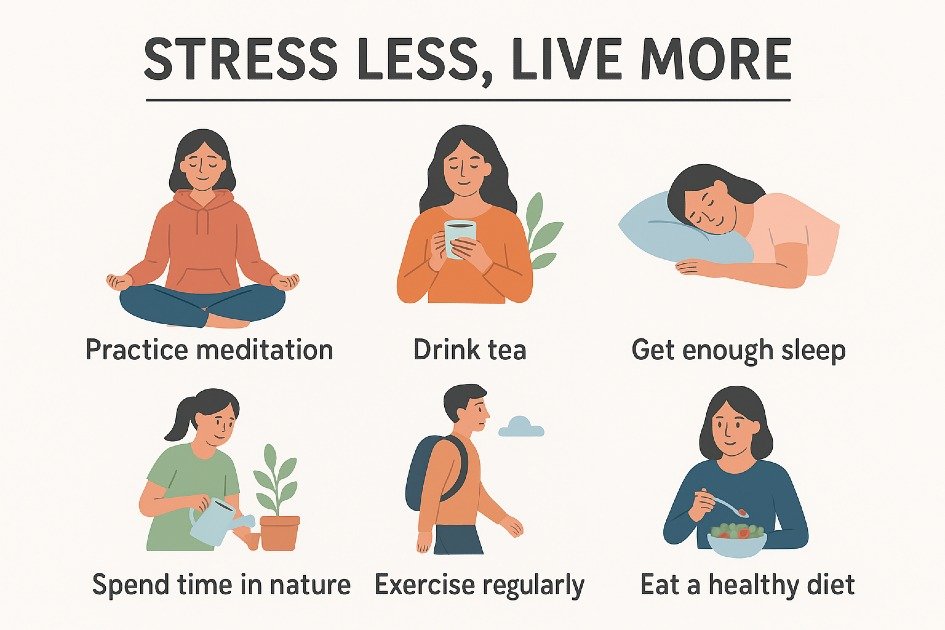
Stress Less, Live More
Stress can be overwhelming, but managing it requires small, steady changes. This simple health tip can be applied to daily life, breaking it down into manageable steps to lower stress.
Breathe Your Way to Calm
Why it works:
- Take deep, slow breaths. They calm your nervous system, slow your heart, and relax your muscles.
How to do it:
- Use the 4-7-8 breathing: breathe in through your nose for 4 seconds, hold for seven, then blow out for eight.
- Do this cycle three times whenever anxiety hits.
- Practice until it feels easy—like hitting a reset button on your day.
I have this tiny habit every day. It costs nothing, needs no equipment, and fits any schedule. It is a simple health tip that works.
Create Mini-Moments of Joy
Why it works:
- Happy moments boost dopamine, the ‘feel-good’ hormone, and fight stress. Even little joys can give you more energy.
How to do it:
- Play your favorite song before bed.
- Take a short break and breathe fresh air outside for five minutes.
- Ring a friend and share a funny story.
I see that joy does not need a special day. I find it in small, everyday moments. When I add joy to my day, eating healthy and staying active feels easier.
Protect Your Mental Space
Why it works:
- Constant noise from notifications and news overstimulates the brain, limiting peace and clarity. Guarding mental space reduces unnecessary triggers.
How to do it:
- Set timers on your apps to control how long you use them each day.
- Switch off push notifications when work ends.
- Instead of scrolling on your phone, spend a few minutes writing in a journal or reading a book.
When I quiet my mind and cut out too much input, I think more clearly and sleep better. I have learned that staying healthy often starts with letting go, not just adding more things.
Move Stress Out of Your Body
Why it works:
- Physical activity not only strengthens the body but also reduces stress hormones, resets the body, and clears the mind.
How to do it:
- Go for a quick 10-minute walk right after work.
- Do yoga stretches that help your muscles relax and ease tension.
- Try dancing freely in your living room—let your body move however it wants.
I do not aim for a perfect workout. I move to let go of what I carry inside. Combined with other simple health habits, my movement shields me from stress.
Practice Gratitude as a Daily Anchor
Why it works:
- Gratitude is a mindset that shifts focus from what is lacking to what is effective, thereby reducing stress and enhancing resilience.
How to do it:
- Each morning, list three things that make you feel thankful.
- Tell someone you love and one thing you appreciate about them every day.
- Place a small gratitude journal by your bed and write one thing you are thankful for each night.
I take a moment each day to feel grateful. It only takes a minute, but it makes my day brighter and reminds me of all the good around me.
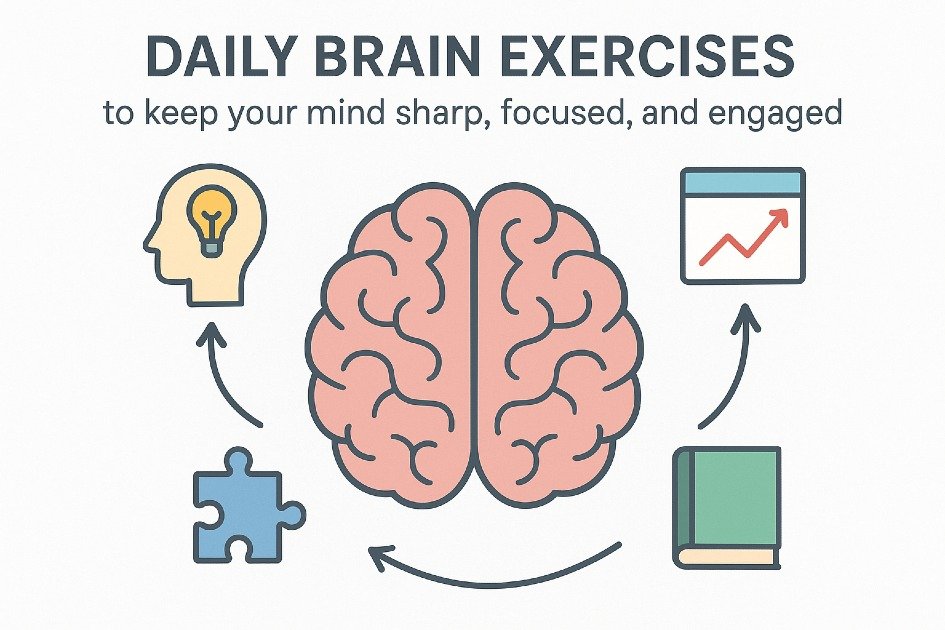
Keep Your Mind Sharp and Engaged
Maintaining mental health is crucial for overall well-being, and incorporating daily habits can help maintain a sharp mind, strong memory, and a positive outlook.
Lifelong Learning Keeps the Brain Young
Why it matters:
- The brain’s strength increases with continuous learning, reducing the risk of memory loss and cognitive decline, as studies show.
How to do it:
- Engage in ten minutes of daily learning.
- Practice with guided memory training programs.
Hobbies and Creativity Boost Mental Energy
Why it matters:
- Creative activities like painting, cooking, writing, or gardening offer stress relief, joy, problem-solving skills improvement, and mental renewal.
How to do it:
- Engage in a weekly enjoyable activity.
- Use affordable tools for ease of starting.
Digital Detox Helps You Reset
Why it matters:
- Excessive screen time can lead to focus issues, scatteredness, and anxiety, while constant notifications can overstimulate the brain and cause restlessness.
How to do it:
- Take at least 30 minutes each day away from screens.
- Walk, stretch, or talk with a friend.
- If you find it hard to stop scrolling, use apps that block social media for a set time.
Harvard Health emphasizes balancing screen time with physical activity, sleep, and face-to-face interactions to mitigate health risks like obesity, sleep disturbances, and cognitive issues.
Social Connections Protect the Brain
Why it matters:
- Loneliness not only harms the heart but also affects brain health, as shared experiences stimulate the mind and release good hormones.
How to do it:
- Call a friend, join a local class, or help in your community.
- Try online groups, they let you join virtual meetups anytime.
Mixing Mental and Physical Health
Why it matters:
- Physical activity strengthens muscles, boosts blood flow to the brain, enhances focus and clarity, and is linked to maintaining a healthy body.
How to do it:
- Add short exercises to your day.
- Take a 15-minute walk after lunch or stretch lightly before bed.
- Moving your body with mindful practices like yoga or tai chi.

Build Strong Relationships
Nurturing relationships are crucial for overall well-being, as they reduce stress, strengthen the immune system, and improve our outlook on life. It is often overlooked, but it is essential for a fulfilling life.
Prioritize Quality Time
Why it matters:
- Spending time with loved ones unoccupied strengthens bonds and demonstrates a deep appreciation for the relationship.
How to do it:
- Plan regular walks, coffee dates, or meetups with friends.
- Put your phone away during talks to build stronger connections.
- Doing things, you both enjoy—making memories together strengthens your bond.
Communicate Openly and Honestly
Why it matters:
- Speaking clearly stops confusion and builds trust.
How to do it:
- Listen closely—give your full attention to the person talking.
- Use “I” statements let me share my feelings clearly.
- Ask often, ‘how are you feeling?’ and listen carefully.
Show Appreciation and Gratitude
Why it matters:
- Showing gratitude strengthens good habits and brings people closer.
How to do it:
- Text a quick thank-you or show appreciation every day.
- Cheer each other on for every small win or milestone.
- Say thank you and recognize the effort people put into your life.
Offer Help and Support
Why it matters:
- Helping others builds trust and encourages them to help you back, making your relationships stronger during challenging times.
How to do it:
- Help someone who is having a challenging time, even with small actions.
- Reach out to friends or family often when they are going through tough times.
- Encourage them and give advice when they ask for help.
Set Healthy Boundaries
Why it matters:
- Setting boundaries keeps your energy strong, stops burnout, and makes your relationships positive instead of tiring.
How to do it:
- Tell others what you can and cannot give—your time, energy, and resources.
- Say no to requests that are too much for you, without feeling guilty.
- Spot harmful behavior and step away when needed.
Embrace Forgiveness and Let Go of Grudges
Understand that everyone makes mistakes. Work on building trust again instead of staying upset about the past.
Why it matters:
- Holding grudges adds stress and hurts relationships. Forgiving lets you and the other person feel free.
How to do it:
- Pause and think carefully before you reply.
- Listen and imagine how the other person feels to understand them better.
Recap: Small Habits Today, Stronger Tomorrow
Your future health is shaped by your choices today. Start with a simple routine that feels manageable and build on it, such as a 10-minute morning stretch or setting a bedtime alarm.
Committing to one positive routine fuels motivation, inspires confidence, and often sparks other healthy shifts. These routines form the blueprint of resilience, helping you face stress, prevent illness, and enjoying more energy for loved ones.
Start with a routine today and continue choosing wisely. Consistency transforms good intentions into lasting vitality.
Frequently Asked Questions
What are the easiest simple health tips to start today?
Starting small, like drinking water, walking, or eating whole food, can improve energy and immunity. Tools like smart water bottle and fitness trackers can help track progress.
How much exercise do I really need for good health?
Consistency in exercise is key to vitality, with 150 minutes of moderate aerobic activity per week and two strength-training sessions enhancing cardiovascular health, bone density, and mental clarity.
Can slight changes in diet really make a significant difference?
Micro-adjustments, such as swapping sugary drinks with herbal teas, leafy greens, or whole grains, can improve digestion, stabilize blood sugar, and reduce inflammation.
What is the connection between stress and physical health?
Chronic stress leads to physiological changes like elevated cortisol, impaired immunity, and inflammation. Mindful stress reduction techniques like deep breathing, journaling, and meditation can lower blood pressure and improve overall well-being.
How do I stay motivated to maintain healthy habits long-term?
Enjoyment and accountability are key to maintaining consistency in health practices. Pairing habits with enjoyable activities, tracking progress, and using smart tools can reinforce the journey.
Are supplements necessary if I follow simple health tips?
Supplements like vitamin D, omega-3s, and magnesium can supplement a nutrient-dense diet, but consult a healthcare provider before use. High-quality options like multivitamin packs or omega-3 capsules complement health tips.
How quickly can I see results from implementing simple health tips?
Persistence and consistent actions lead to compounding benefits over time, such as improved mood, energy, and hydration, which may take weeks to months to achieve.
Can I apply these tips if I have a busy schedule?
Simple health tips, such as morning stretching, meal preparation, and mindful breathing, can yield remarkable results without disrupting daily routines. Time-saving solutions include meal prep containers or portable resistance bands.

